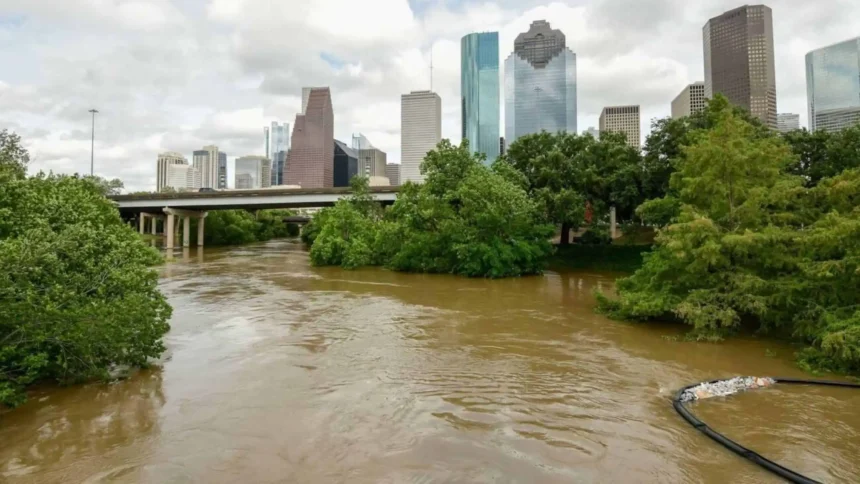Hurricane Beryl Houston hit near Matagorda, Texas, on July 8, 2024, as a Category 1 hurricane, about 110 miles south of Houston.
It brought strong winds of up to 80 mph and a lot of rain, causing flooding and power outages in Southeast Texas.
As it moved closer to land, it stayed strong until it reached Houston, causing a lot of damage before getting weaker.
Beryl Houston was especially bad because it hit directly on the city, with the center of the storm going over the west side, causing a lot of damage from fallen trees and problems with infrastructure.
Immediate Aftermath
Hurricane Beryl Houston affected Houston by shutting down power stations which affected more that 2.2 million houses, schools and businesses which accounted for 80% of CenterPoint Energy customers in Houston.
In the middle of the Beryl Houston storm, three million residents in Texas were without electricity, and some of them stayed without electricity for more than one week due to the destruction of power lines and distribution networks.
They have been scorching, and probably over 20 people have lost their lives; most of them to heat and the inability to use gadgets that require electrical power.
It was hard for businesses to operate and the loss of power became a primary source of frustration as people began to wonder if CenterPoint Energy did a good enough job.
CenterPoint Energy
Houston relies on CenterPoint Energy to supply electricity and natural gas to millions of people in the city.
Being an Electrical Power utility company, it has structures such as power lines and substations for this.
That said, after hurricane Beryl Houston it was pointed out to have been least prepared as well as slow to respond to the disasters and make reparations.
That is why Texas Governor Greg Abbott and others were frustrated, noting that longer blackouts demonstrated larger issues with the company.
They wanted to know how CenterPoint was operating and implied that the problems were not limited to storm differences but a problem with the company.
Infrastructure Vulnerabilities Exposed
Hurricane Beryl Houston exposed how big flaws in the power grid exist in Houston especially when dealing with CenterPoint Energy.
The storm was an opportunity to look at the fact that the system is very old and fragile, the hurricane was even mild, category 1, but it knocked out power for nearly 3 million people.
Reliability and energy use CenterPoint is apparently among the worst according to the experts and yet people in Houston are forced to ask why their city was not ready for such a massive storm.
The old system not only showed its woes during the hurricane but also worried about subsequent big storms.
Public Utility Commission Investigation
Ken Paxton, the Attorney General of Texas, is investigating CenterPoint Energy for how it handled Hurricane Beryl, looking into claims of fraud, waste, and misuse of public funds.
The investigation seeks to find out if the utility’s actions caused serious problems for people in Houston, like long power outages and higher utility bills.
They are focusing on CenterPoint’s decision to lease large generators that were not used during the storm, questioning their usefulness and the utility’s readiness for emergencies.
If the investigation finds illegal actions, there could be legal consequences and calls for better disaster planning and accountability in the utility industry.
The Public Utility Commission of Texas is also looking into CenterPoint’s emergency plans and infrastructure, expected to finish by December 2024.
Community Response and Frustration
Houston’s residents are very upset and hopeless because the power has been out for a long time after Hurricane Beryl.
They have been in very hot temperatures and are losing important services. Many have shared their experiences on social media, showing how hard it is, especially for families that need medical equipment.
As Beryl Houston got worse, some people became angry at the workers trying to fix the power lines, even yelling and threatening them.
This anger comes from feeling helpless and desperate about not having electricity for a long time.
Local officials are trying to encourage people to help the workers fix things faster, by working together during the recovery.
The Human Cost of Infrastructure Failures
After Hurricane Beryl Houston hit, at least 20 people died in Houston because of power outages and extreme heat.
Many of these deaths were from heatstroke, especially among the elderly and sick. Families were deeply affected by these losses, with stories like that of a 60-year-old man dying of heatstroke in a home without air conditioning.
The community was very sad and angry about these deaths, and officials and experts stressed the need to improve infrastructure to prevent such tragedies in the future.
Proposed Solutions for Resilience
Additional recommendations to Houston’s power grid from Hurricane Beryl involve “microgrids” and “renewable energy sources”.
Microgrids can also act autonomously from the main grid, energy production and management is localized, this is very important during power blackouts.
They can use clean resources such as solar and wind, which will eliminate the use of fossil resources and decrease carbon emissions of carbon.
The benefits of microgrids include energy security improvement, efficiency boosting, and possible consumer’s money saving.
Hurricane Beryl Houston has raised the need for huge transformation of the energy structures in Houston.
It is possible for the government, and the utilities, along with the communities involved to embrace new concepts such as the small power grids and green energy.


Leave a Reply